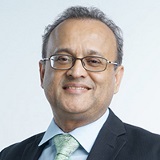2019 MRS Spring Meeting
Time and time again, "multidisciplinary" research is touted as essential to innovation. That is why, from April 22-26, 2019, researchers working in seemingly unrelated fields gathered in Phoenix, Arizona, to promote, share and discuss issues and developments across disciplines.
The 2019 MRS Spring Meeting & Exhibit is the key forum to present research to an interdisciplinary and international audience. It provided a window on the future of materials science, and offered an opportunity for researchers—from students and postdoctoral fellows, to Nobel and Kavli Prize Laureates—to exchange technical information and network with colleagues.
The 2019 MRS Spring Meeting was held at the Phoenix Convention Center and nearby Sheraton Grand Phoenix.
Symposium Topics
CP02—Design and In Situ TEM Characterization of Self-Assembling Colloidal Nanosystems
CP03—Advances in in situ Techniques for Diagnostics and Synthetic Design of Energy Materials
CP04—Interfacial Science and Engineering—Mechanics, Thermodynamics, Kinetics and Chemistry
CP05—Materials Evolution in Dry Friction---Microstructural, Chemical and Environmental Effects
CP06—Smart Materials for Multifunctional Devices and Interfaces
CP07—From Mechanical Metamaterials to Programmable Materials
CP08—Additive Manufacturing of Metals
CP09—Mathematical Aspects of Materials Science—Modeling, Analysis and Computations
EP01—Liquid Crystalline Properties, Self-Assembly and Molecular Order in Organic Semiconductors
EP02—Photonic Materials and Devices for Biointerfaces
EP03—Materials Strategies and Device Fabrication for Biofriendly Electronics
EP04—Soft and Stretchable Electronics—From Fundamentals to Applications
EP05—Engineered Functional Multicellular Circuits, Devices and Systems
EP06—Organic Electronics—Materials and Devices
EP07—Next-Generation Interconnects—Materials, Processes and Integration
EP08—Phase-Change Materials for Memories, Photonics, Neuromorphic and Emerging Application
EP09—Devices and Materials to Extend the CMOS Roadmap for Logic and Memory Applications
EP10—Heterovalent Integration of Semiconductors and Applications to Optical Devices
EP11—Hybrid Materials and Devices for Enhanced Light-Matter Interactions
EP12—Emerging Materials for Plasmonics, Metamaterials and Metasurfaces
ES01—Organic Materials in Electrochemical Energy Storage
ES02—Next-Generation Intercalation Batteries
ES03—Electrochemical Energy Materials Under Extreme Conditions
ES04—Solid-State Electrochemical Energy Storage
ES05—Cooperative Catalysis for Energy and Environmental Applications
ES06—Atomic-Level Understanding of Materials in Fuel Cells and Electrolyzers
ES07—New Carbon for Energy---Materials, Chemistry and Applications
ES08—Materials Challenges in Surfaces and Coatings for Solar Thermal Technologies
ES09—Advanced Materials for the Water-Energy Nexus
ES10—Rational Design Hierarchical Nanostructures for Photocatalytic System
ES12—Redox-Active Oxides for Creating Renewable and Sustainable Energy Carriers
ES14—Materials Circular Economy for Urban Sustainability
ES15—Fundamental Understanding of the Multifaceted Optoelectronic Properties of Halide Perovskites
ES16—Perovskite Photovoltaics and Optoelectronics
ES18—Frontiers in Organic Photovoltaics
ES19—Excitonic Materials and Quantum Dots for Energy Conversion
QN01—2D Layered Materials Beyond Graphene---Theory, Discovery and Design
QN02—Defects, Electronic and Magnetic Properties in Advanced 2D Materials Beyond Graphene
QN03—2D Materials---Tunable Physical Properties, Heterostructures and Device Applications
QN04—Nanoscale Heat Transport---Fundamentals
QN06—Emerging Materials for Quantum Information
QN07—Emergent Phenomena in Oxide Quantum Materials
QN08—Colloidal Nanoparticles---From Synthesis to Applications
SM01—Materials for Biological and Medical Applications
SM02—Progress in Supramolecular Nanotheranostics
SM03—Growing Next-Generation Materials with Synthetic Biology
SM04—Translational Materials in Medicine---Prosthetics, Sensors and Smart Scaffolds
SM05—Supramolecular Biomaterials for Regenerative Medicine and Drug Delivery
SM07—Bioinspired Materials—From Basic Discovery to Biomimicry
Meeting Chairs
-

The University of Alabama
-

University of California, Los Angeles
-

Nanyang Technological University
-

University of Notre Dame
-

Karlsruhe Institute of Technology— Institute for Applied Materials
Stay Connected to MRS Journals!


